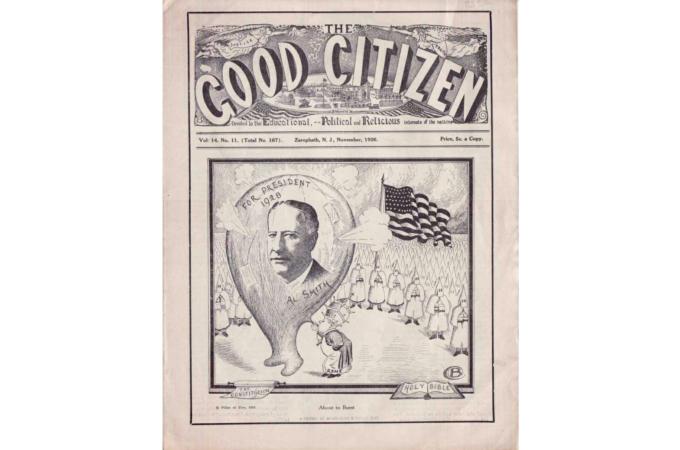Al Smith, a happy warrior
Eighty-eight years ago a Happy Warrior from the streets of New York ran for President of the United States. His name was Al Smith, and he deserves to be remembered now as another bitter presidential campaign enters its decisive phase.
In writing my new book Catholics in America (Ignatius Press) profiling 15 prominent Catholics who mirror the pros and cons of the Americanization process at work in American Catholicism, I had no hesitation including Smith.
Here was a Catholic politician who stood by his Catholic faith despite what it cost him politically. The Church and American politics today would both look greatly different--and healthier--if Catholic politicians since Smith had generally followed his lead.
He was born poor in Lower Manhattan in 1873. Dropping out of school at age 13 to help support his family after his father's death, he rose by dint of intelligence, decency, and hard work to become a four-term governor of New York. He was recognized as a champion of progressive social legislation on issues like workmen's compensation, pensions for women, and child labor.
In 1924 he sought the Democratic vice-presidential nomination. It was then that Franklin Roosevelt, in a nominating speech, called him a "Happy Warrior", and the tag stayed with him the rest of his life.
Smith didn't make it onto the ticket in 1924, but in 1928 the Democrats turned to him as their presidential nominee. To no one's surprise, least of all Smith's, the reality of an unapologetic practicing Catholic running for president evoked a new upsurge of the anti-Catholicism that had plagued American life since colonial times.
Even before Smith's nomination, the Atlantic Monthly published an "open letter" asking whether, as a Catholic, Smith could be trusted to uphold religious freedom. Smith defended himself, but things went downhill. The resurgent Ku Klux Klan opposed him. A U.S. senator denounced the Catholic hierarchy while promoting talks by ex-nuns who had supposedly "escaped" from their convents. Smith's religion became a large, ugly issue in the presidential race.
In September, speaking in Oklahoma City, the candidate confronted the bigotry head-on. Calling the constitutional prohibition of a religious test for public office a "vital principle" of the American system, Smith said he knew of "no greater disaster to this country than to have the voters...divide upon religious lines."
He fought back against his anti-Catholic critics, Smith said, "not only because I am a good Christian but because I am a good American."
Probably no Democrat could have won in 1928, the crest of an economic boom for which the Republicans took credit. But Smith was overwhelmed, receiving 41% of the popular vote and 87 electoral votes to Republican Herbert Hoover's 58% and 444 electoral votes. States that commonly ordinarily Democratic went for the GOP candidate instead. Smith's political career was essentially over. He died in 1944.
In September og 1960 another Catholic presidential candidate, John F. Kennedy, traveled to Houston to deliver a rebuttal of the anti-Catholicism that once again had reared its head. Speaking to an audience of Protestant ministers, Kennedy declared that as president he wouldn't let religion affect how he did his job, thus giving voice to the separation of faith from life that the Second Vatican Council would soon stigmatize as "one of the gravest errors of our time."
Kennedy opened a door through which other self-identified Catholic politicians have rushed while supporting things like abortion and same-sex marriage. Which is one reason why it's worth recalling a better model: a Happy Warrior named Al Smith.
- Russell Shaw is the author of more than twenty books. He is a consultor of the Pontifical Council for Social Communications and served as communications director for the U.S. Bishops.



















